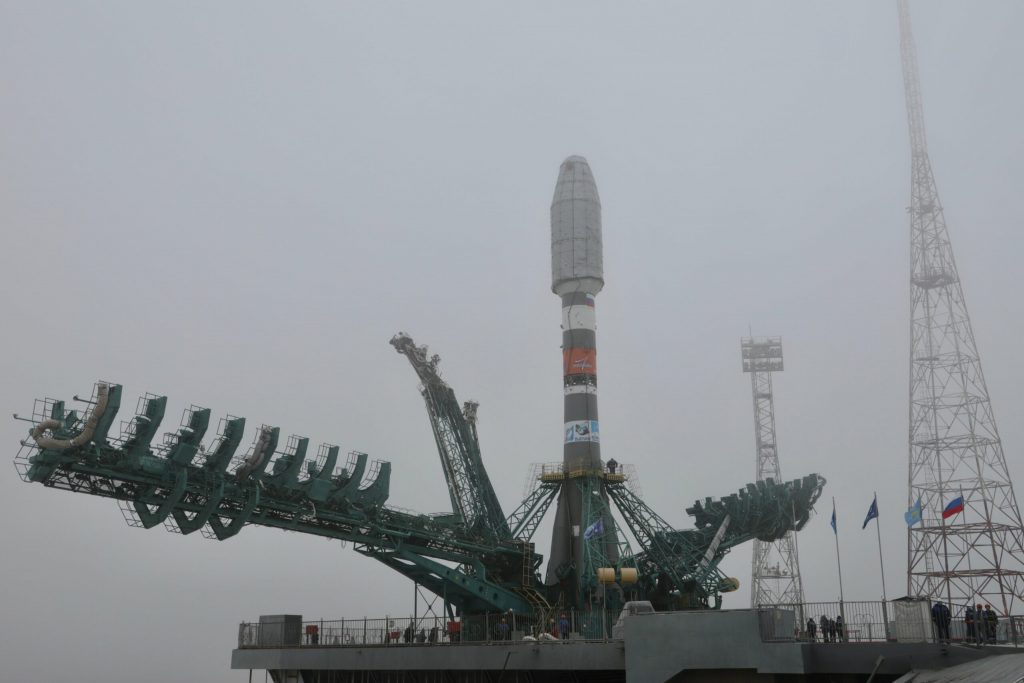TAMPA, Fla. — OneWeb is considering American, European, Indian and Japanese rockets for launching its remaining 220 satellites after the company announced March 3 that it would stop using Russia’s Soyuz rocket.
OneWeb, which is partly owned by the British government, has launched 428 of a planned 648 broadband satellites aboard Soyuz rockets under a 19-launch contract with Arianespace of Evry, France.
All 13 of OneWeb’s launches to date have been on Soyuz and OneWeb planned to launch five more missions by the end of August to enable its low Earth orbit constellation to provide global services. A sixth Soyuz mission had been planned to provide in-orbit backup capacity.
Those plans were upended after Russia’s Feb. 24 invasion of neighboring Ukraine sparked the most dangerous geopolitical crisis since the Cold War.
Preparations for OneWeb’s scheduled March 4 launch from Russia’s Baikonur Cosmodrome in Kazakhstan were suspended after Roscosmos Director General Dmitry Rogozin said Russia would only allow the launch to proceed if OneWeb guaranteed its satellites would not be used for military purposes, and the British government divested its stake in the company.
On March 2, Rogozin posted a video on social media of Baikonur workers removing OneWeb’s livery from a Soyuz rocket that had rolled out to the pad the same day carrying 36 OneWeb satellites. That same day, London-based OneWeb ordered its staff to leave Baikonur.
Стартовики на Байконуре решили, что без флагов некоторых стран наша ракета будет краше выглядеть. pic.twitter.com/jG1ohimNuX
— РОГОЗИН (@Rogozin) March 2, 2022
OneWeb announced March 3 that its board of directors “has voted to suspend all launches from Baikonur.”
U.K. Business Secretary Kwasi Kwarteng said that the British government supported OneWeb’s decision, adding: “In light of Russia’s illegal and unprovoked invasion of Ukraine, we are reviewing our participation in all further projects involving Russian collaboration.”
The UK Government supports OneWeb’s decision
In light of Russia’s illegal and unprovoked invasion of Ukraine, we are reviewing our participation in all further projects involving Russian collaboration https://t.co/dQapXfzsuf
— Kwasi Kwarteng (@KwasiKwarteng) March 3, 2022
With Soyuz off the table, OneWeb told SpaceNews the company is seeking alternatives.
“We’re looking at U.S., Japanese and Indian options,” Chris McLaughlin, OneWeb’s chief of government, regulatory affairs and engagement, said March 3.
“But in the first instance, we’re pointing to Ariane and saying you still owe us a number of launches.”
Arianespace spokeswoman Cyrielle Bouju did not respond to requests for comment.
Soyuz out of the picture
Roscosmos said March 4 that the Soyuz rocket, with the Fregat upper stage and OneWeb spacecraft, had been removed from the pad.
“In the coming days, specialists from Roscosmos enterprises will disassemble it into its component parts,” the space agency said in a tweet translated via Twitter.
⚡️ Ракета «Союз-2.1б» с разгонным блоком «Фрегат» и космическими аппаратами OneWeb доставлена в монтажно-испытательный корпус.
В ближайшие дни специалисты предприятий Роскосмоса проведут её разборку на составные части. pic.twitter.com/vpUpJfEKsL
— РОСКОСМОС (@roscosmos) March 4, 2022
Arianespace also announced in a March 4 news release that it is suspending all Soyuz launches operated by Arianespace and Starsem, a Russo-French joint venture that commercializes Soyuz launches.
“Arianespace will work with its partners to ensure the well-being of the goods and means currently in Baikonur,” Arianespace said.
“Arianespace is in close contact with its customers and French and European authorities to best assess all the consequences of this situation and develop alternative solutions.”
This article was updated March 4 after the Soyuz was removed from the pad

